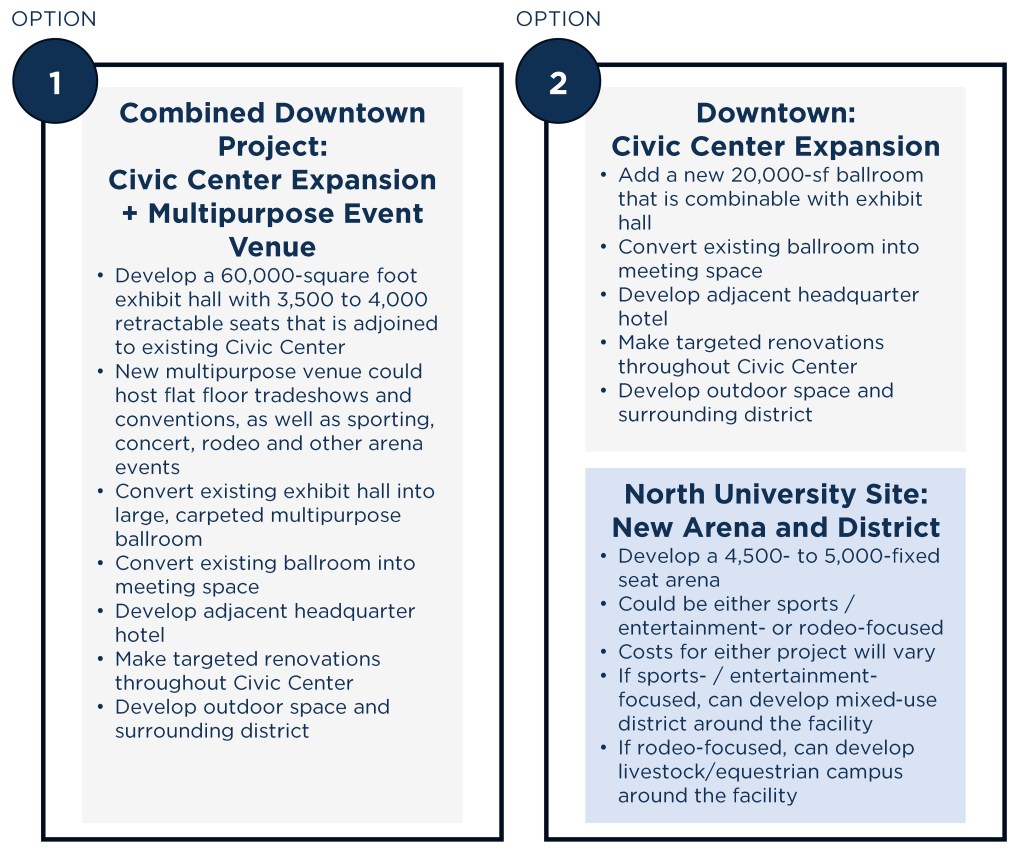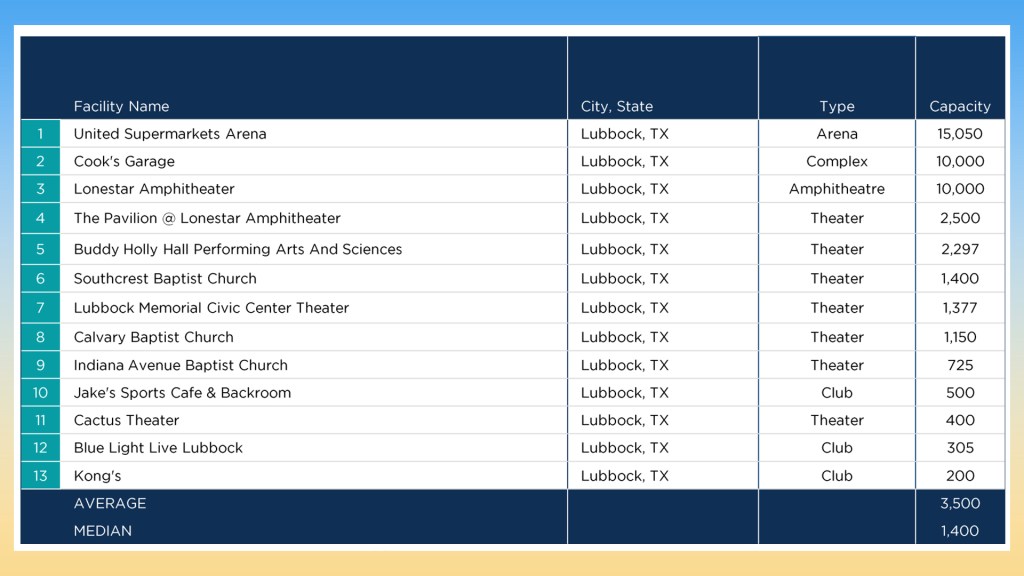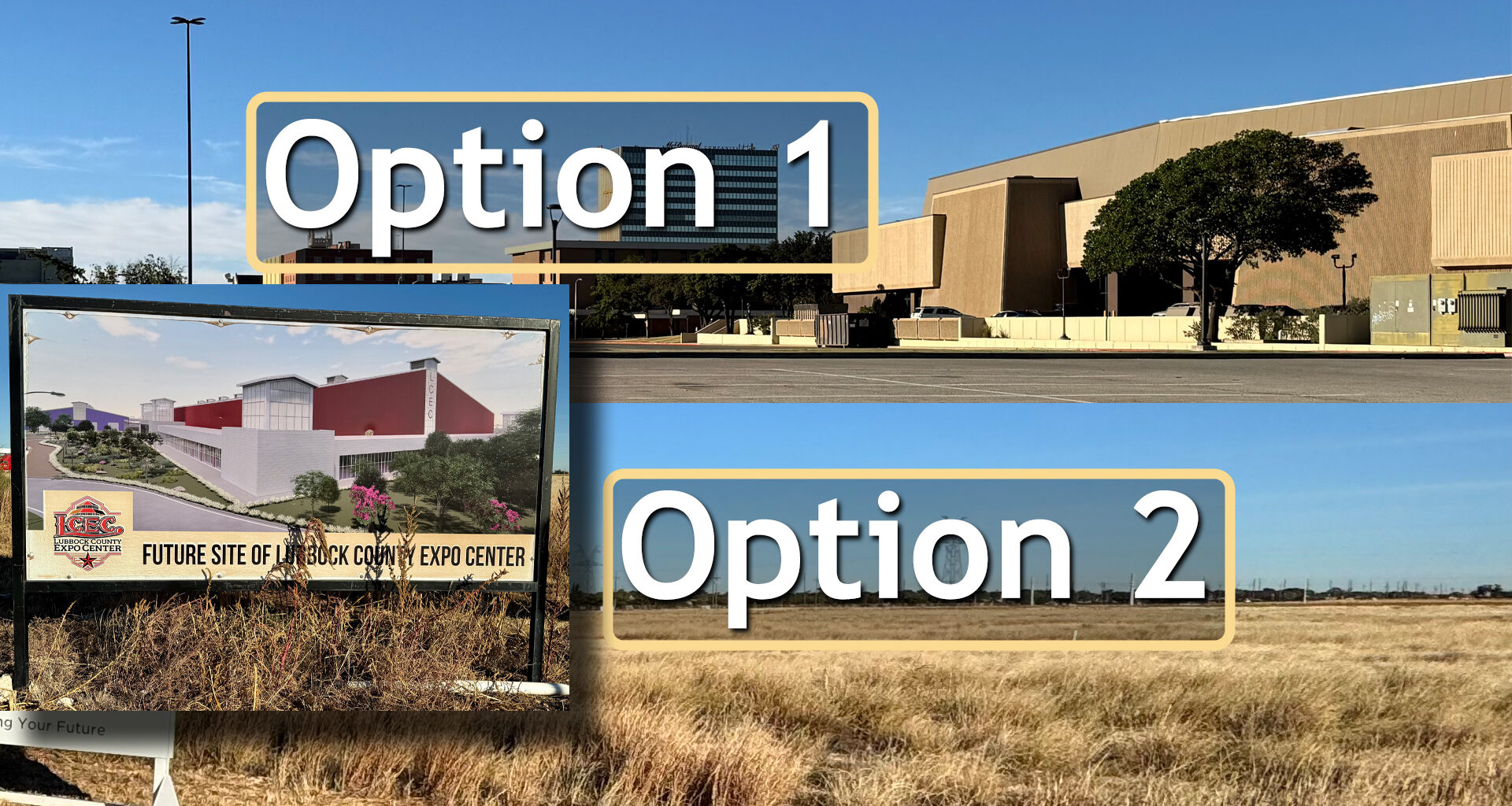Lubbock is among the weakest performers in the nation’s mid-size markets when it comes to some events, big conventions and nationally-known shows.
The city’s Memorial Civic Center generates $600,000 of revenue every year with an operating loss exceeding $2.6 million a year, according to a study from Conventions, Sports & Leisure International (CSL).
“Comparable” civic centers in America generate an average of $6 million per year, said the $90,000 study jointly paid for by Lubbock and Lubbock County. CSL presented results from the study last week to the Lubbock County Commissioners.
“The current Civic Center has reached the end of its functional life,” the study said.
The study was asked to explore two Civic Center options:
Renovate the Civic Center and create a new county expo center on the same downtown property, moving the Mahon Library. We broke the story of those plans in February.
Renovate the Civic Center and build the expo center at its planned site on North University Avenue and North Loop 289.
Local leaders do not agree on where to put the proposed expo center, which we covered here.
Either option means more entertainment options and jobs for residents. But the study also makes it clear whatever option is chosen for the Civic Center site there’s a need for:
Nearby hotels that meet big event standards.
Restaurants or shops within easy walking distance.
Facilities accommodating certain kinds of events and shows.
“Establishing a vibrant entertainment district in Lubbock with food, beverage, and retail options could significantly enhance the arena experience and aligns with national industry trends,” the study said.
That’s not happening now, the study said, showing how people who attend Civic Center events then go elsewhere in the city (more on this below).
During the commissioners meeting, Tyler Othen, director of CSL’s convention and tourism department, was asked about traffic under option 1 and said there would need to be a separate study for that.
Option 2 is workable, he said, and, “It’s maybe more ready-made [for rodeos] and has more space for trailers and livestock events. … There are creative ways to do it downtown, whereas you don’t have to be nearly as creative if you move out to North University.”
Click here to read the study (60.4 MB, 186 pages).
In this story:
Current needs and problems
Overview of two options
What led up to this moment
Digging deeper into the need
A look at other existing local facilities
 Civic Center, right, Mahon Library, left with downtown skyline in back. Under one option, the library would move to another downtown location to make room for expo center.
Civic Center, right, Mahon Library, left with downtown skyline in back. Under one option, the library would move to another downtown location to make room for expo center.
Jobs and entertainment
Right now, the study indicated the Civic Center generates 286 local jobs – some full time, others part time. That number could go up to 443 for a joint facility or 502 with separate facilities.
It also means Lubbock getting shows now skipping the city, said Othen.
“Feld Entertainment with their family shows, … they’re now skipping over the market. They could use a mid-sized venue for maybe 4,000 to 5,000 families that’d be coming to their shows,” Othen told commissioners Tuesday night.
Feld shows include motorsports (monster trucks), ice skating productions, motocross, the Ringling Bros. & Barnum & Bailey Circus along with licensed shows like Marvel Universe LIVE and Sesame Street LIVE.
Two options – an overview
“Option 1” is a combined Civic Center expansion and multipurpose event center (expo center) on the same property.
The plan envisions a 60,000-square-foot multipurpose event center where the Mahon Library currently sits, featuring 3,500 retractable seats and a total capacity of approximately 5,500.
Lubbock Mayor Mark McBrayer said in February, “If anything is done with the library, it will be moved to a new location downtown.”
The new expo center would be connected to the current civic center by a pre-function space and exhibit hall. This option includes a 40,000-square-foot ballroom, an outdoor event space, and improved facades and landscaping. There would also be a new 300-room convention hotel south of 9th Street.
Putting two facilities together might reduce the Civic Center’s deficit between half a million and a million dollars per year, Othen said.
“Option 2” is a Civic Center expansion with Lubbock County going its own way on the proposed expo center. We covered the latest plan here – a facility patterned after Abilene’s Taylor Telecom Arena.
Option 2 constructs a new 20,000-square-foot multipurpose ballroom adjoining the existing Civic Center exhibit hall. (By comparison, option 1 called for a 40,000 square foot ballroom.)
The current banquet hall would be converted into a junior ballroom and meeting rooms. This option introduces dedicated drop-off areas, new facades and enhanced landscaping. Just like option 1, a new convention hotel would anchor the south end on the other side of 9th Street.
Under option 2, the Mahon Library stays at its current location, in contrast to getting moved in option 1.

Click to enlarge. Credit: Conventions, Sports & Leisure International

Credit: Conventions, Sports & Leisure International
Leading up to now
The Lubbock Memorial Civic Center opened in 1970 in honor of the 26 people who died in the 1970 tornado. Renovations were made ten years ago.
Along the way, the city demolished the Lubbock Municipal Coliseum and Auditorium in 2019 with voter approval – removing 8,344 fixed seats for rodeos, concerts, sports and other events. The facility was built in the 1950s and the city balked at renovation costs.
“Its absence has left a gap in Lubbock’s ability to host largescale entertainment, prompting renewed consideration of a modern replacement,” the study said.
Perhaps most famously, the ABC Pro Rodeo, benefiting the Boys and Girls Club of Lubbock has moved to Levelland’s Mallet Center.
Amid this need, the county formed the Lubbock County Expo Center (LCEC) committee and held a 2018 election to raise an estimated $40 million in hotel occupancy tax (HOT).
LCEC at one point was proposing a $92 million project at North University Avenue and North Loop 289 with private fundraising to cover what HOT did not. But in recent months, LCEC chairman Randy Jordan said private support has not matched the proposed price tag and he’s now talking about a smaller arena.
For the Civic Center property, with help from State Representative Carl Tepper, Lubbock secured a new state law allowing the city to create a Project Financing Zone. An incremental portion of tax money, including sales tax otherwise going to the state, can stay in Lubbock to offset renovations or new construction. The estimated amount is more than $120 million.
Before that, Lubbock commissioned a 2019 study to lay the groundwork for future Civic Center plans, but COVID put that on hold.
 Proposed expo center site off North Loop 289.
Proposed expo center site off North Loop 289.
Deep dive into the need
Regardless of option 1 or option 2, CSL looked at what Lubbock needs.
Othen told commissioners CSL spoke with 70 different event organizers representing 300 recurring events.
“Many of these conversations were an hour long, so about 70 hours … learning about what is the ‘take’ on Lubbock, how often would they bring events here and what event facilities do they need to bring their events,” he said.
The study described an outdated building – and the nearby area.
“More and more event planners, as they’re choosing where they want to go for conventions or conferences, are considering the environment around the building, not just the building itself,” Othen said.
Using a service called Placer.AI, the study looked at cell phone data for people who visit Lubbock.
“You can track where people are migrating to or from when they go to an event. This is a sample of five conventions we [looked at] from the Civic Center. And 20 percent are going to Canyon West, 13 percent to West End Center, and then much smaller slivers of the sample are going to other destinations outside of downtown,” Othen said.
When visitors leave the Civic Center, they drive away from downtown.
“They’re not going to places of interest in downtown,” Othen said.
The study said:
“The Civic Center is outdated, with awkward entrances, a confusing layout, and inflexible exhibit and meeting space configurations. Major elements (HVAC, ADA access, acoustics) require upgrades.”
“[The] current exhibit hall size and layout do not meet the needs of groups like FFA and other convention-scale users. There is also no adequate back-of-house or subdividable functionality.”
“The absence of proximate convention-quality hotel properties and … HQ hotel creates challenges for attracting high impact conventions and events.”
“The demolition of the Municipal Coliseum has created a void for large-scale indoor events (e.g., concerts, rodeos, expos). A new arena or expo hall could meet regional demand and modern user expectations.”
“Ballroom space is where we’re falling short. … Our current ballroom is 14,000 square feet. This jumped out to us pretty early in the study effort as a potential limiting factor,” Othen said.
A ballroom is often treated as a multipurpose space and is important for high-impact conventions.
There’s no need to demolish the current space but instead build 20,000 square feet of space, under option 2, Othen said, also suggesting convincing someone in the private sector to build a 300-room headquarters hotel. An existing junior ballroom would be remodeled and turned into meeting space.
“One big trend in the industry is also outdoor event space. A lot of conventions are using that for their cocktail hours or networking events,” Othen said.
The leading “controllable drivers” of lost business at the Civic Center include:
Space limitations
Limited hotel rooms
Date “availability conflicts”
“These factors directly contribute to the loss of events, attendance, hotel room nights and associated economic impact. Addressing these gaps … represents a key opportunity to strengthen the facility’s competitiveness and capture additional demand,” the study said.
Big projects, like a civic center expansion or new arena, can have “transformative” impacts on “quality of life, community prestige, perception by visitors” and more, according to the study.
Attract events, not ‘cannibalize’ existing events
If a new arena (expo center, regardless of where) is not carefully thought out, it could “cannibalize” local events already happening rather than attracting something new.
The priority should be a venue for events “that would skip Lubbock” today, Othen said.
The Lubbock market currently has 13 concert facilities listed below, holding an average of 3,500 people (and a median of 1,400).

Credit: Conventions, Sports & Leisure International
The United Supermarkets Arena (USA) holds 15,000, but Othen said, “The concerts it is hosting are around 7,200 tickets. These aren’t concerts selling out the venue, they’re more so mid-sized shows.”
Cook’s Garage and the Lonestar Amphitheater are already local competitors. Around Texas, Oklahoma and New Mexico, the study identified 40 competing arenas. The Mallet Center in Levelland was listed separately, as a regional, not local, venue. It holds 1,800 people, according to the study.
Lubbock County should prioritize events needing a dirt floor – regardless of where the facility gets built – to host rodeo and livestock events, according to the study.
“We do see the need for more of a boutique mid-size multi-purpose event center or arena, 4,500 to 5,000 capacity, dirt floor capabilities,” Othen said.
The study also looked at conventions.
“In terms of flat floor event facilities, Lubbock has only three venues with over 10,000 square feet of contiguous space,” the study said.
Those are the United Supermarkets Arena (USA), the Apex Event Center, and the Overton Hotel & Conference Center.
“Both United Supermarkets Arena and Apex Event Center offer notable amounts of space; however, these are subprime exhibit spaces and are not purpose-built for hosting flat floor events,” the study said.
What’s next
The decision on where to put an expo center lies with the County Commissioners. Mayor Mark McBrayer is firmly in support of option 1 – putting the new arena on the civic center site. Jordan is not.
Under option 1, the development cost and daily operation is cheaper. But the overall impact – new jobs and total number of events – is slightly lower. Under option 2, the development and operation is more expensive but the overall impact is slightly higher.
In our previous coverage, County Judge Curtis Parrish said, “Any decisions moving forward with the venue project will be made first with a recommendation from our citizens advisory group.”
That advisory group is the Local Government Corporation which works with LCEC.
Related
Related posts



